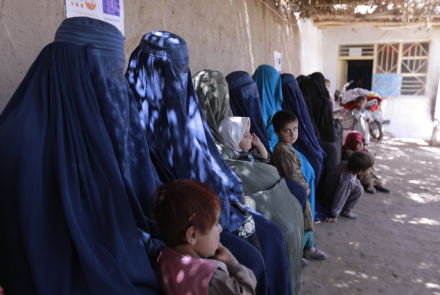Health
UNFPA: 78% of Health Services in Afghanistan Serve Women and Girls

The United Nations Population Fund (UNFPA) has shared a report showing that 78% of its health services in Afghanistan were directed at women and girls. These services were provided through 995 health centers across the country. The agency works with 18 different partners to offer these services in all 34 provinces.
The UNFPA said that a total of 13.7 million Afghans received healthcare support in 2024. This is a 48% increase compared to the year before. Most of the support was related to reproductive, maternal, newborn, child, and adolescent health. The increase shows that more people, especially women and girls, are getting the care they need.
This large growth in health coverage is seen as a success, especially at a time when Afghanistan continues to face political and economic challenges. Many areas still suffer from a lack of basic services, and this makes healthcare hard to reach, especially for those in remote villages.
People living in rural areas have said that access to healthcare remains a big problem. In mountainous regions and distant districts, many children and mothers cannot visit health centers because of poor roads and long distances. Some people have asked for more health posts in their communities. Others have asked the government and aid groups to increase the number of clinics in remote places.
Health professionals also believe there is a strong need for more female health workers. In many areas, cultural rules stop women from visiting male doctors. As a result, many women give birth at home without trained help, which can lead to serious problems or even death for both mother and child. By hiring more female doctors and midwives, this risk can be reduced. Female health workers are also better able to educate women about family planning and basic care during pregnancy.
Doctors in cities and rural areas agree that more support is needed. They say that improving facilities and hiring more staff would help solve many problems. In areas where there are already female health workers, more women feel safe and comfortable getting care. This also helps lower the number of deaths linked to childbirth and illness.
At the same time, there are warnings from international organizations about future risks. Groups like the World Health Organization have said that many health centers in Afghanistan could close by June if funding is not continued. They estimate that services may drop by up to 80% in the coming months. This would create a serious crisis for women and children who depend on these services.
If these closures happen, thousands of women and children may lose access to safe births, vaccines, emergency care, and other vital services. Aid groups are calling for urgent financial support to keep health centers open. They also say it is important to continue supporting local staff who are trained and already working in the community.
Afghanistan’s healthcare system is already under pressure. Even before the political changes in 2021, many clinics lacked proper equipment, staff, and medicine. Since then, the situation has become more difficult, with fewer donors and limited international help. Despite these problems, groups like UNFPA continue to work in the field, focusing on areas where needs are greatest.
The focus on women and girls is especially important. In many cases, women are the last to receive care due to social and financial barriers. By making sure services reach them first, UNFPA is helping to protect the most vulnerable members of society.
There is still a long way to go. Many families in Afghanistan continue to face health challenges. Children under five often suffer from malnutrition and lack of vaccines. Pregnant women struggle to get prenatal checkups. Girls miss school due to health problems or family responsibilities. All of these issues are linked to poor healthcare access.
However, the latest numbers from UNFPA show that with enough support and coordination, positive change is possible. Health centers can reach more people, especially women and girls. But this work must continue. It needs regular funding, trained staff, and strong partnerships between local and international organizations.








